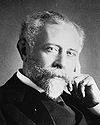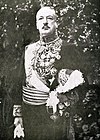User:Mccapra/resident
The Resident General of France in Tunisia was the official representative of the French government in Tunis during the French protectorate of Tunisia (1881 - 1956). The office holder was known as the Minister Resident of France in Tunisia until June 23, 1885 and after September 1, 1955 they were replaced by a High Commissioner.
Scope of the role
[edit]The position of Minister-Resident General of France in Tunisia stems from the Treaty of Bardo signed on May 12, 1881, article 5 of which stated that "the government of the French Republic will be represented, with His Highness the Bey of Tunis, by a Minister-Resident General who will ensure the execution of this act and who will be the intermediary for the relations of the French government with the Tunisian authorities for all common affairs of the two countries". Furthermore, article 6 of the same treaty specified that "His Highness the Bey undertakes not to conclude any act of an international nature without having informed the French government of it and without its prior agreement ". Sadok Bey gave effect to this by the decree of June 9, 1881, appointing the resident minister who acted as his Minister of Foreign Affairs.
In addition to this key role, the French Residents General had broad administrative and financial responsibilities under the first article of the conventions of La Marsa (1883) which stated: "In order to facilitate the accomplishment of the protectorate by the French government, His Highness the Bey of Tunis undertakes to carry out the administrative, judicial and financial reforms that the French government deems useful."
In the early days of the protectorate, opposition to the Resident General’s reforms did not come from the Tunisian government but from the French military power represented by General Boulanger who commanded the occupying troops in Tunisia. Convinced that the civil power must yield before the military power, he refused to obey the instructions of the Resident Minister Paul Cambon. Faced with this opposition, Cambon requested the support of the French government and clarification about his mission. He obtained satisfaction by a presidential decree of June 23, 1885 which affirmed his primacy. Cambon accordingly pursued his planned reforms and chaired the council of ministers.
Transition to self-government
[edit]After this the Bey no longer had any power other than to sign the decrees proposed to him. It was not until 1951 that the presidency of the council of ministers was entrusted to the grand vizier Mohamed Chenik instead of the Resident General, who nevertheless retained the power to veto the decrees of the Tunisian government.
The reforms of the March 2, 1954 further reduced his power since his assent to government decrees was no longer necessary. However he did still need to countersign Beylical decrees, which ensured he retained a significant amount of power.
Internal autonomy was finally granted to Tunisia under the conventions of the June 3, 1955 and accordingly the Resident General was replaced with the “High Commissioner of France in Tunisia” who served as the intermediary of the French government with the Tunisian authorities for the affairs common to the two countries and was responsible for the protection and representation of the rights and interests of French nationals in Tunisia.
With independence on March 20 1956, the High Commissioner was in turn replaced by the French ambassador to Tunisia.
List of Residents General
[edit]| Name | Portait | Nominated | Left office |
|---|---|---|---|
| Ministers Resident of France in Tunisia | |||
| Théodore Roustan | 
|
13 May 1881 | 28 February 1882 |
| Paul Cambon | 
|
28 February 1882 | 28 October 1886 |
| Residents General of France in Tunisia | |||
| Justin Massicault | 
|
23 November 1886 | 5 November 1892 |
| fr:Charles Rouvier | 
|
5 November 1892 | 14 November 1894 |
| René Millet | 14 November 1894 | 15 November 1900 | |
| Georges Benoit | 15 November 1900 | 27 December 1901 | |
| Stephen Pichon | 
|
27 December 1901 | 29 December 1906 |
| Gabriel Alapetite | 
|
29 December 1906 | 26 October 1918 |
| Étienne Flandin | 
|
26 October 1918 | 1 January 1921 |
| Lucien Saint | 
|
1 January 1921 | 2 January 1929 |
| fr:François Manceron | 
|
18 February 1929 | 29 July 1933 |
| Marcel Peyrouton[1] | 
|
29 July 1933 | 21 March 1936 |
| fr:Armand Guillon | 
|
17 April 1936 | 18 October 1938 |
| Eirik Labonne | 22 November 1938 | 3 June 1940 | |
| Marcel Peyrouton | 
|
3 June 1940 | 18 July 1940 |
| Jean-Pierre Esteva | 
|
26 July 1940 | 10 May 1943 |
| Charles Mast | 
|
10 May 1943 | 22 February 1947 |
| fr:Jean Mons | 22 February 1947 | 13 June 1950 | |
| fr:Louis Périllier | 13 June 1950 | 13 January 1952 | |
| fr:Jean de Hauteclocque | 13 January 1952 | 2 September 1953 | |
| Pierre Voizard | 
|
2 September 1953 | 5 November 1954 |
| fr:Pierre Boyer de Latour du Moulin | 
|
5 November 1954 | 31 August 1955 |
| High Commissioner of France in Tunisia | |||
| Roger Seydoux | 13 September 1955 | 20 March 1956 | |
See also
[edit]References
[edit]- ^ Bass, Joseph-André (1 July 1948). "Les Maudits" (PDF). Droit et Liberté (9 (77)): 2. Retrieved 8 March 2013.
